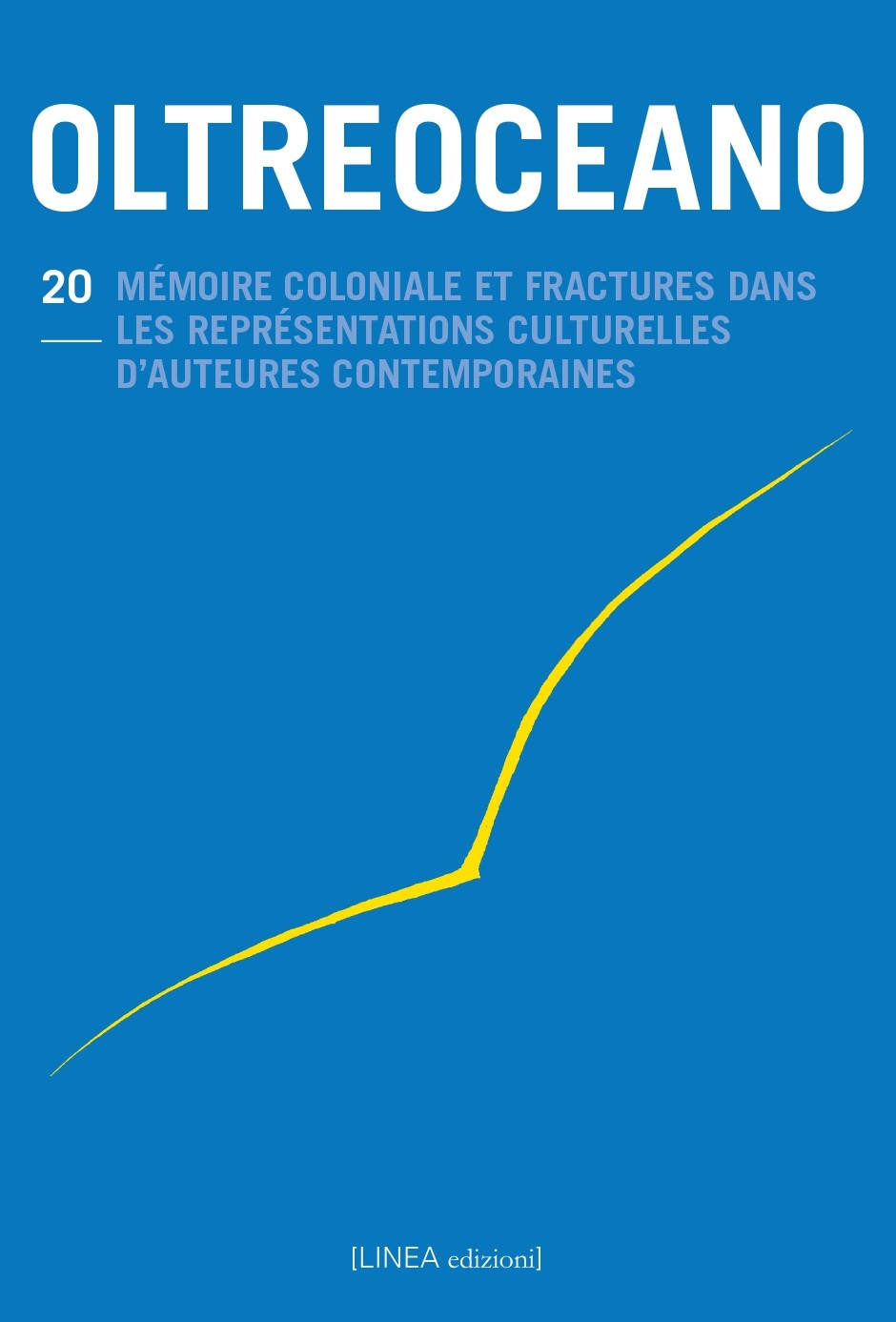Une question de regard? La marque coloniale chez les écrivaines afropéennes
DOI:
https://doi.org/10.53154/Oltreoceano51Keywords:
afropéen, écriture féminine, regard, postcolonial, formes de vieAbstract
Fatou Diome, Léonora Miano et Lisette Lombé sont des écrivaines afropéennes qui mettent en relief la stigmatisation de l’appartenance raciale dans les discours et les comportements sociaux. Elles témoignent de la persistance d’une approche de matrice coloniale qui se manifeste de manière implicite dans les actions, dans les choix, dans les discours. L’analyse de trois ouvrages permettra de mettre en lumière comment la littérature traite de ces situations.
A Matter of Look? The Presence of the Mark of Colonial Discourse in Afropean Women Writers
Fatou Diome, Léonora Miano and Lisette Lombé are Afropean writers who highlight the stigmatisation of racial belonging in social discourse and behaviour. They testify to the persistence of a colonial matrix approach that is implicit in actions, in choices and in discourses. The analysis of three works will shed light on how the literature deals with these situations.
Una questione di sguardo? La presenza del marchio del discorso coloniale nelle scrittrici afropee
Fatou Diome, Léonora Miano e Lisette Lombé sono scrittrici afropee che evidenziano la stigmatizzazione dell'appartenenza razziale nel discorso e nel comportamento sociale. Testimoniano la persistenza di un approccio di matrice coloniale che è implicito nelle azioni, nelle scelte e nei discorsi. L'analisi di tre opere farà luce su come la letteratura affronta queste situazioni.
Downloads
References
Ajuriaguerra, J. de (1969): Regard-vision et regard-sortilège. In J. de Ajuriaguerra, La fonction du regard (pp. 363-370). Paris: INSERM.
Aumont, J. (2011): L’image, 1990. Paris: Armand Colin.
Brossard, A. (1992): Psychologie du regard: de la perception visuelle aux regards. Neuchâtel: Delachaux et Niestlé.
Colas-Blaise, M. (2012): Forme de vie et formes de vie: vers une sémiotique des cultures. Nouveaux Actes Sémiotiques, 115. Tiré de https://www.unilim.fr/actes-semiotiques/2631
Coste, F. (2017): Explore. Investigations littéraires. Paris: Questions théoriques.
Diome, F. (2007): La Préférence nationale. Paris: Présence africaine.
Faure, S. (2015, 9 avril): Chronique “Au mot”. Afropéen [adj.]: qualifie le fait d’être noir et né en Europe. Libération.fr. Tiré de https://www.liberation.fr/debats/2015/04/09/afropeen-adj-qualifie-le-fait-d-etre-noir-et-ne-en-europe_1237052/
Fontanille, J. (1995): Style et formes de vie. In G. Maurand (Éd.), Le Style. 15e colloque d’Albi Langages et signification (pp. 67-83). L’Union / CALS.
Houellebecq, M. (1998): Les particules élémentaires. Paris: Flammarion.
Lombé, L. (2018): Black Words. Amay: L’Arbre à paroles.
Lombé, L. (2020): Mes collages. Tiré de https://www.lisettelombe.com/collages
Ortel, Ph. (2008): Vers une poétique des dispositifs. In Ph. Ortel, Discours, image, dispositif. Penser la représentation, 2 (pp. 33-58). Paris: L’Harmattan.
Macé, M. (2016): Styles. Critique de nos formes de vie. Paris: Gallimard.
Miano, L. (2008): Afropean Soul. Paris: Flammarion.
Miano, L. (2012): Écrits pour la parole. Paris: L’Arche.
Robin, M. (2009): Premiers regards, premiers échanges. In E. Herbinet & M.-Cl. Busnel (Éds), L’aube des sens. Les cahiers du nouveau-né, 5, pp. 26-32.
Starobinski, J. (1999): L’œil vivant: Corneille, Racine, La Bruyère, Rousseau, Stendhal. Paris: Tel.
Vergès, F. (Dir.), (2017): Manifeste de l’Atelier IV. Tiré de https://www.fmsh.fr/fr/college-etudesmondiales/28533
Vergès, Fr. (2019): Un féminisme décolonial. Paris: La Fabrique.
Wittgenstein, L. (2004): Recherches philosophiques. Fr. Dastur, M. Élie, J.-L. Gautero, D. Janicaud & É. Rigal (Trad. fr.). Paris: Gallimard.
Downloads
Published
How to Cite
Issue
Section
License

This work is licensed under a Creative Commons Attribution-NonCommercial-ShareAlike 4.0 International License.
The authors undertake to comply with the following conditions, which are considered accepted at the time of submission of their contributions.
The sending of a text implies that it is unpublished and not submitted to be published elsewhere.
1. If accepted, the author shall confer on the publisher the right to publish and distribute it both in paper form and in the online electronic edition. The published articles will be downloadable and made available in open access.
2. Provided that it correctly indicates that the first publication took place in the journal Oltreoceano. Rivista sulle migrazioni the author has the right to: a) reproduce the article in separate extracts or collected in a volume; b) publish the article on their personal website or teaching site provided that these sites are of a non-commercial nature; c) deposit the article in online archives of a non-commercial nature, linked to the institution they belong to or as part of projects for the non-commercial dissemination and open access of scientific works.
The use of contributions by third parties, for commercial or otherwise unauthorized purposes, is not allowed. The publisher declines all responsibility for the unauthorized use of the material published in the journal.












